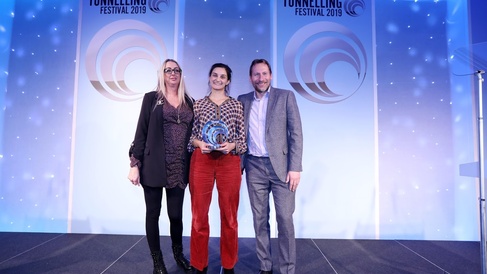
A CSIC monitoring and modelling system optimising energy-efficient growing conditions at an underground hydroponic farming facility housed in former WW2 air raid shelters has won the Innovation in Tunnel Fit-Out, Operations and Maintenance Award at the New Civil Engineer (NCE) Tunnelling Festival Awards 2019. The festival aims to bring together the tunnelling community to showcase the latest innovations and the 10th Annual Tunnelling awards.
As urban populations are set to rise by 2.6 billion by 2050, placing greater strain on the availability of natural resources in cities, there is increasing interest in hydroponics as a resource and space-efficient method to grow food closer to point of use. Space for commercial greenhouses in cities like London is limited leading to urban farmers turning to unconventional spaces, including tunnels, for growing.
CSIC Investigator Dr Ruchi Choudhary, who leads the Energy Efficient Cities initiative (EECi) at the Department of Engineering, and her team have been monitoring and modelling the tunnels for three years to optimise energy use and crop growth in the tunnels 33 metres below the busy streets of Clapham, London. Growing Underground uses hydroponic systems to sustainably produce pesticide-free crops. Their micro greens and salad leaves are sold through retailers including Ocado and Marks & Spencer. The company aims to be carbon neutral and was awarded the BBC Future Food Award in 2017.
Hydroponic farms can be power hungry: the environmental conditions must be carefully managed for ideal crop yield and growing time. To optimise the farm resource CSIC, together with PhD students Melanie Jans-Singh and Rebecca Ward, developed a monitoring scheme combining (i) an extensive wireless sensor network and (ii) manual recording of crop data and farm events. Data analysis of multivariate data, physical modelling and machine learning are used to develop a ‘digital twin’ of the farm.
Melanie, an EECi PhD student investigating the integration of urban farming to cities reusing wasted resources, presented how CSIC and Growing Underground have collaborated to develop a suite of data driven tools to optimise the underground growing environment. She then collected the award at the NCE gala event held in London on 5 December. She said: “It’s been great to share and discuss with tunnelling experts how a farm can be integrated to a tunnel, to hopefully spread the idea to other spaces."
Supported by an EPSRC Institutional Sponsorship Grant, more than 100 sensors monitoring temperature, pH, air velocity, humidity, CO2, and light have been deployed. The project’s data analysis differs from conventional models as it combines structured and unstructured data. Farm efficiencies and future farm designs are tested through two tools being developed in partnership with the Data-Centric Engineering Programme of The Alan Turing Institute: a calibrated physical heat and mass transfer model and a data-driven forecasting model. The greater understanding of the relationships between the environmental variables, farm controls and crop growth is then used to improve the performance of the farm.
Results to date have enabled modification of ventilation configurations, lighting schedules, and location of crops, yielding 25 per cent increase in crop yield.
“As Growing Underground aims to expand to seven more tunnels, our understanding of the effect of plants and the farm controls required for a hydroponic greenhouse is being scaled up to other locations," said Melanie. "This work demonstrates how monitoring can be developed for an urban farm in a derelict space, and how performance indicators can be drawn out from different kinds of data in order to assist the growth and limit the energy use of a hydroponic farm in a tunnel.”
.
